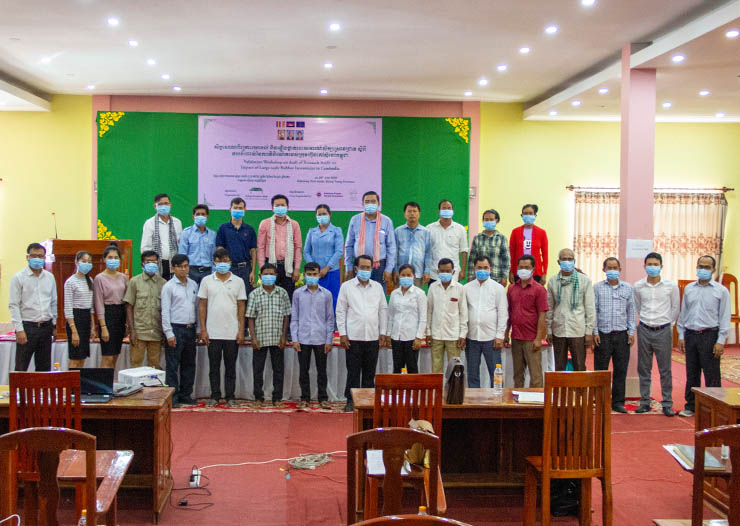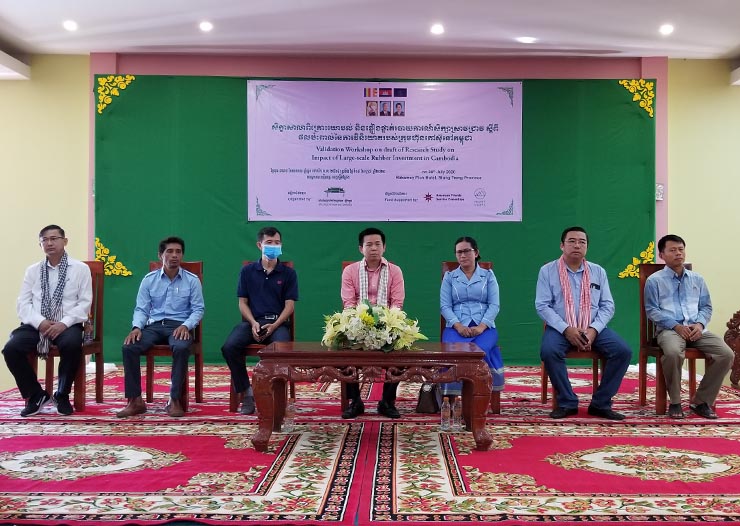
The NGO Forum on Cambodia (NGOF) organized a Validation Workshop on the Draft Research Study on Impact of Natural Rubber Investment in Cambodia which held on July 08, 2020 at Raksmey Pich Hotel, Stung Treng Province. There were 31 participants (06 women) from Provincial Administration of Stung Treng and Mondulkiri, PDAFF of Stung Treng and Mondulkiri, Local authority and Community of Kbal Romeas Chas and Trpeang Krahorm, Oxfam, NGOF, SVC, RNN, and MVi.
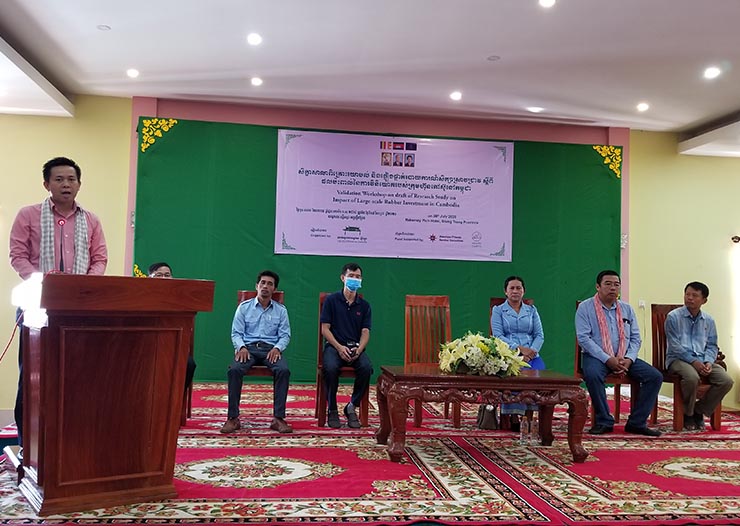
Dr. Tek Vannara, Executive Director of NGOF, in a welcome remark. He said that this event is organized by the NDF-C of NGOF that working toward the policy influence for sustainable agriculture. He also insisted all participants as stakeholders for this research study to have a deep review and provide inputs for improvement. Moreover, this will contribute to promote the natural rubber plantation in cambodia since cambodia is facing the market issue. This research will come up with a national validation workshop in next step and it will be produced a document and widely share to public. This research will share in international platform to discuss for either benefits for small-scale rubber plantation. In this context, NGOF and Oxfam are currently initiate a collaboration with line ministry to escalate the sector as we have seen the tough situation of rubber products. We also would like to see the final products of rubber and its value chains have been engage with the buyer at international market. He thanks for this active participation so far and wishing all the best to all participants.
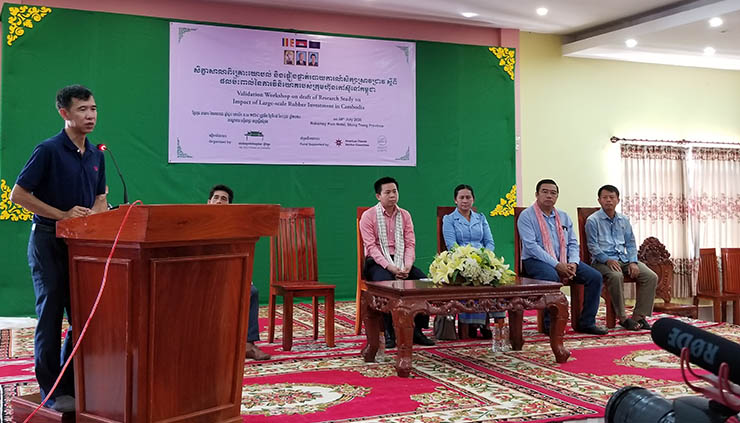
Mr. Sok Khim, Program Manager, Oxfam Cambodia had an impression on agro-industry such rubber plantation that Oxfam has been supporting including coconut oil and sugar cane, etc. Since this sector is require more labor in the production processes to comply the international standard to be follow such human right respect, trading agreement, etc. So far, we have discussed with GDR about fluctuation of rubber market is still dramatic low because of Cambodian rubbers are export to neighboring countries. This may need more commitment to discuss with the international market/buyer in order to escalate our products. . He stresses on how to access to international market; this is a challenge that we all have to consider. Importantly, we need to learn from Vietnam since they have a good trend in rubber market with international market. Since there is least focus on this issue, it needs more commitment from all stakeholders. Last but not least, he interested in the workshop today since it will be useful documentation for concern stakeholders to learn and use the result for improvement.
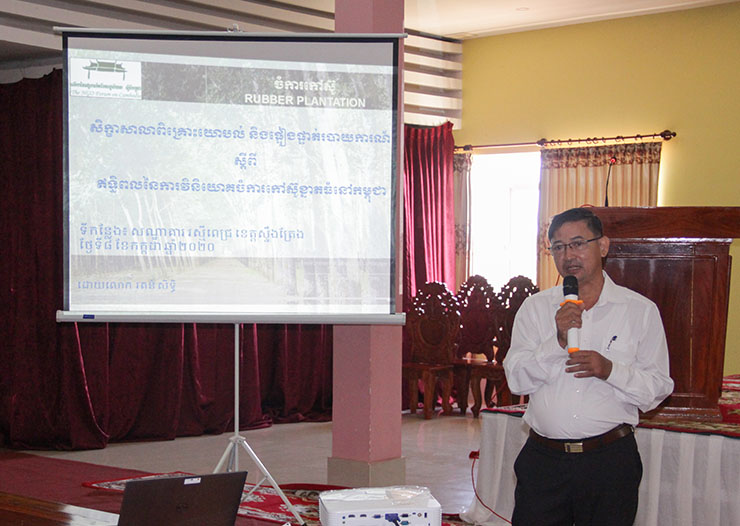
Presentation of research finding by Dr. Rath Sethik, Researcher. The study presenting legal framework, environmental impact assessement and recommendation. The research methodology which target in Stung Treng Province and Rattanakiri Province. The target company are: 1) SIV GUEK INVESTMENT CO., LTD (Stung Treng), and 2) HOLY YKO INDUSTRIAL CO., LTD (Ratanakiri). He empersized on the data collection which:
• Qualitative data: 1) Desk review, 2) field observation, 3) Indept group discussion, 4) Focal point interviews
• Quantitative data: Observation (Household interviews for 40 HH/company)
Dr. Rath Sethik added more on the research finding:
Law and Regulation
• Investment law (1994-2017) amendment.
• Law on Economic Land Concession (2007)
• Law on Environment Protection and Natural Resource Management (1996)
Policy
• Rectangular policy (Phase 4) National Strategic Development Plan (2019-2023)
• Agriculture Strategic Development Plan
• Agriculture Sector Master Plan 2030
Institution
• The Council for the Development of Cambodia (CDC)
• Ministry of Agriculture, Forestry and Fishery
General Directorate of Agriculture
Cambodian Rubber Research Institute.
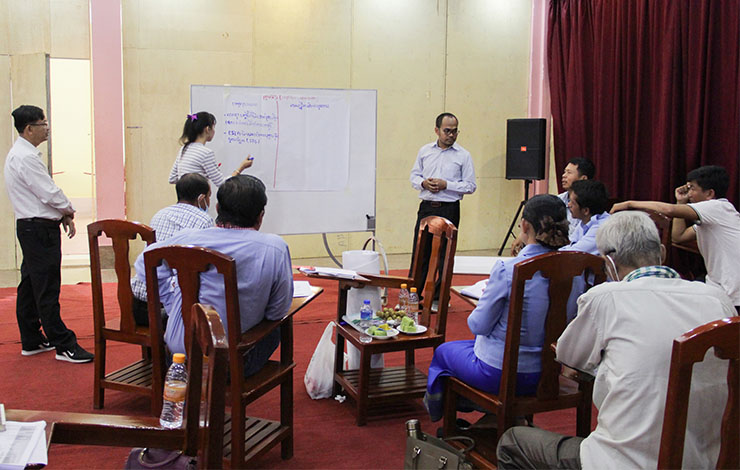
Group Discussion
Group 1: Government and CSO
- Challenges:
• Land title registering still incomplete (BT6) for rubber plantation area (ST).
• Constrains in rubber exportation (including price), (it related to the rubber law of Cambodia)
• ESIA does not exist of some company (ST)
• Lack of contract
• Exporting raw material (rubber)
• Struggling over land grabbing between company and community (ST)
• Struggling over losing cattle of community in the company area. - Solution:
• Accelerate land registering (PLUPC)
• Improve to have ESIA (PLUPC)
• Increase worker’s wage (motivation fund), provide suitable homestay, access to roads, market, transportation, school, pagoda and hospital.
• Eliminate or infringe on freedom
• Develop the quality of the resin (good storage technique) and cut the resin
• Promote a sales contract
• Increase the role of the rubber community
• Increase the attention of relevant ministries - Suggestions
• Urge the Ministry to issue rubber law as soon as possible
• Establish a semi-finalized rubber community and processing center to reach a sales agreement
• Increase the promotion of technical freezing
• Promote cooperation and prevent cross-border exports
• Establish rules and regulations
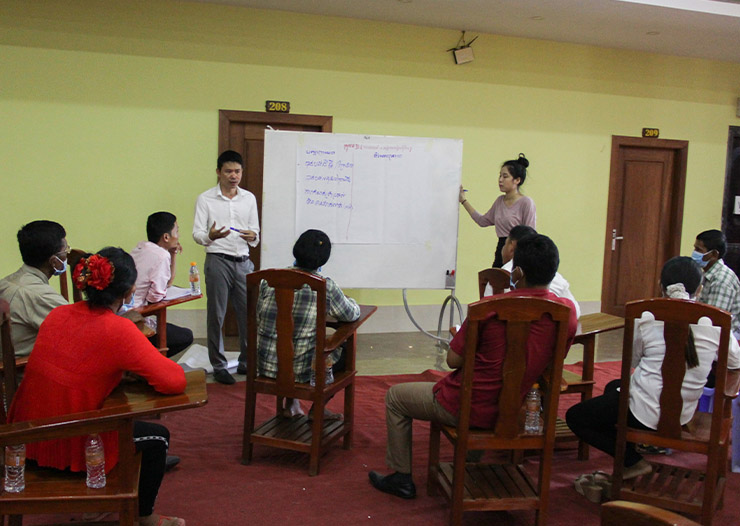
Group 2: Community and CSO
- Challenges:
• Loss of farmland and non-timber forest products
• Unspecified demarcation (ST)
• The company intends to clear more land on the disputed land (mountain)
• The company has wood processing handicrafts (natural wood) cut from the disputed land area (Krabei chrum and neighboring communities).
• Loss cattle (cows) into company land - Solution:
• Accelerate the registration of collective land (Kbal Romeas) on the land of indigenous people of more than 7,000 hectares. Request for land provided to the company that has not been cleared for the community to enjoy (on old land that was once cultivated)
• Ask professional institutions to measure and determine the boundaries properly.
• Caused by workers.
• The company must have specific regulations to stop this activity (catching animals)
• By the mountain is the belief of the community, please reserve them for IP community.
• Request for professional officers to cooperate with the authorities to prevent logging and timber
• The district forum must have representatives of companies, communities and professional officers, authorities to address.
Finally, Dr. Rathsith summarized and summarized the group discussions, with the second group presenting.
Further Suggestion: Additional comments on standardized rubber processing, as people do not know the technical know-how of rubber processing that a matter leads to poor quality, so it is desirable that those who have the technical experience in rubber should have a clear information program in order to enable all rubber plantation owners produces as standards with high quality and internationally recognized.
